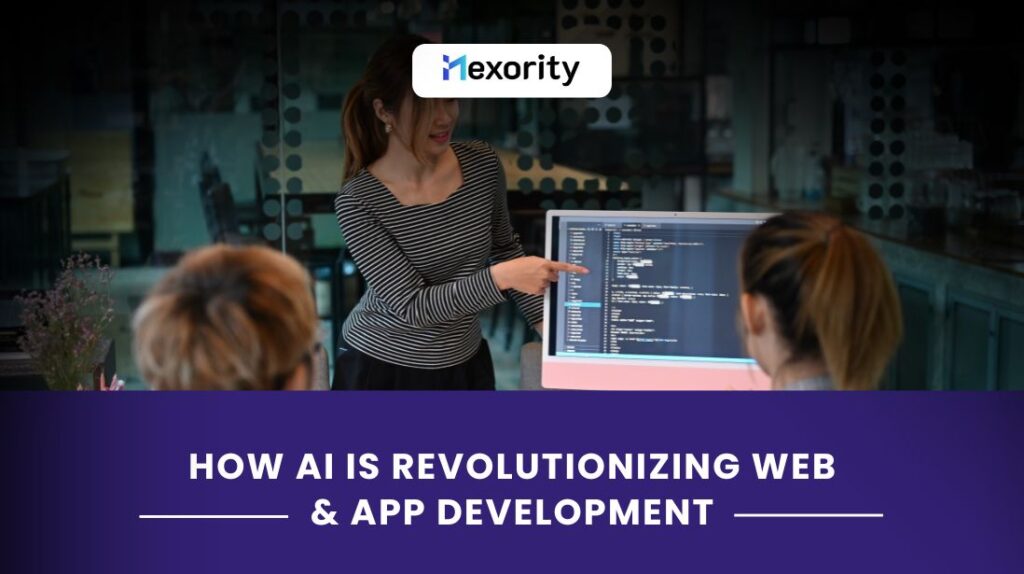Ed-Tech
How AI Is Revolutionizing Web and App Development in 2025

The Rise of AI in Software Development
In 2025, AI has become a cornerstone of digital innovation, redefining how web and mobile apps are designed, developed, and deployed. At Nexority Infotech, we embrace AI-driven technologies to deliver intelligent, scalable, and future-ready digital solutions for our clients. With the growing need for speed, personalization, and intuitive user experiences, artificial intelligence is more than a trend—it’s a transformation.
Key Benefits of AI in Web and App Development
Faster Time-to-Market with AI Automation
AI-powered tools like automated testing, smart code suggestions, and deployment bots enable developers to bring products to market quickly. At Nexority, we integrate these tools into our development stack to help clients reduce go-to-market time without compromising quality.
Cost Reduction Through Intelligent Resource Allocation
By automating repetitive tasks such as bug fixing, performance testing, and basic UI design, businesses can save both time and budget. Our AI-driven workflows help allocate developer resources more efficiently, reducing overheads and increasing output.
Improved Personalization Using AI-Powered Analytics
AI allows us to analyze user behavior and tailor content, design, and functionality to individual users. This level of personalization enhances user engagement and boosts ROI for businesses we work with.
AI-Powered Tools Transforming Web Design and Coding
Code Completion and Generation with AI (e.g., GitHub Copilot)
Tools like GitHub Copilot help developers write better code faster by suggesting real-time code completions. At Nexority, our developers use such tools to minimize coding errors and speed up development cycles.
AI in UI/UX Design: Tools Like Uizard and Figma AI
We use AI-powered design tools like Uizard and Figma AI to rapidly prototype interfaces and iterate on designs based on usability insights and behavior predictions.
Chatbots and Virtual Assistants for User Engagement
Nexority integrates intelligent chatbots for 24/7 support, onboarding, and user engagement. These virtual assistants enhance customer satisfaction and reduce manual support workload.
Real-World Examples of AI in App Development
AI in E-commerce Apps: Personalized Shopping
Many of our clients in the e-commerce space have adopted AI to show personalized product recommendations, run predictive search, and tailor promotions.
Healthcare Apps with Predictive Algorithms
We have developed health tech apps that use AI to analyze symptoms, deliver accurate predictions, and assist patients with real-time medical insights.
AI-Driven Fintech Solutions
Nexority has helped fintech companies implement AI-driven fraud detection, smart credit scoring, and automated financial planning tools.
How AI Enhances User Experience (UX) and Interface (UI)
Predictive User Behavior Modeling
AI analyzes click patterns, scroll depth, and engagement metrics to anticipate user actions. This helps us design smarter interfaces that respond dynamically to user needs.
Automated A/B Testing with Machine Learning
Machine learning automates the A/B testing process, adjusting variations in real-time to optimize UX. We implement this in landing pages, product flows, and signup funnels.
Voice & Gesture Recognition for Accessibility
At Nexority, we incorporate voice and gesture controls into our applications to make digital experiences more inclusive and accessible for users with disabilities.
Challenges and Ethical Considerations in AI-Driven Development
Data Privacy and Security Concerns
Data handling is crucial in AI development. We ensure strict compliance with GDPR and other regulations, implementing robust encryption and ethical data practices.
Bias and Fairness in AI Algorithms
Our development protocols include auditing AI outputs to eliminate bias and ensure fairness, especially in sensitive sectors like finance and healthcare.
Human Oversight in AI-Driven Development
AI augments, but doesn’t replace human insight. At Nexority, our expert developers always validate AI outputs for accuracy and ethical alignment.
Future Trends: What’s Next for AI in Web and App Development?
Generative AI for Complete Web/App Prototypes
Tools like Builder.io and Vercel AI SDK are changing how apps are built. We leverage generative AI to produce rapid MVPs and client demos within hours.
Integration of AI with AR/VR for Immersive Experiences
Nexority is pioneering the integration of AI with AR/VR in retail, education, and training apps to deliver hyper-personalized and immersive environments.
Low-Code/No-Code Platforms Powered by AI
We help non-technical founders build their digital products through AI-assisted low-code platforms, reducing development barriers and accelerating launch timelines.
Conclusion: Embracing AI for Smarter Digital Solutions
As AI continues to revolutionize digital development in 2025, businesses that adapt will lead the market. Nexority Infotech is proud to be at the forefront of this transformation, building intelligent, human-centric, and scalable digital solutions powered by the latest in AI innovation.
Whether you’re a startup or an enterprise, now is the time to embrace AI and future-proof your digital ecosystem.
Frequently Asked Questions (FAQs)
What is AI in web and app development?
AI in development refers to the use of machine learning and automation to improve how websites and applications are designed, built, and optimized.
How is AI used in website development?
AI is used for code generation, performance optimization, SEO recommendations, and creating dynamic, personalized content in web development.
How does AI help in mobile app development?
AI assists in predictive analytics, user behavior modeling, chatbot integration, and automated UI/UX enhancements in mobile app development.
What role does AI play in modern app development?
AI enhances functionality, automates repetitive tasks, ensures better performance, and provides personalized experiences.
How does AI improve user experience in apps?
AI personalizes content, predicts user actions, enables voice commands, and ensures seamless navigation, improving overall UX.
What are the benefits of AI in web development?
Benefits include faster development, lower costs, personalized user journeys, and intelligent data analysis.
How does AI optimize performance in apps?
AI monitors usage data, identifies bottlenecks, and automates performance tweaks to ensure fast and smooth app experiences.
What are some real-life examples of AI in app development?
Examples include Amazon’s recommendation engine, AI-powered health diagnosis apps, and fintech fraud detection systems.
How is AI used for personalization in web apps?
By analyzing user behavior, AI customizes layouts, content, product suggestions, and interactions for each user.
What are the best AI tools for web development?
Popular tools include GitHub Copilot, ChatGPT, Figma AI, Adobe Sensei, and Google ML Kit.
Which AI tools are used in app development?
Tools like TensorFlow, Dialogflow, Firebase ML, and Microsoft Azure AI are widely used in app development.
How can developers use ChatGPT for app development?
ChatGPT can generate code, write content, debug logic, and serve as a smart assistant during development.
What is the role of machine learning in web development?
ML helps analyze user behavior, recommend improvements, detect anomalies, and automate decisions in web development.
How does AI impact SEO in web development?
AI automates keyword research, content optimization, performance analysis, and schema implementation for better rankings.
Can AI generate SEO-friendly content?
Yes, tools like ChatGPT can generate optimized, relevant, and structured content aligned with SEO best practices.
Is AI good for writing blog content for websites?
Absolutely. With the right prompts, AI can produce high-quality, engaging, and SEO-friendly blog articles.
What is the future of AI in web and app development?
AI will continue to evolve into autonomous development agents capable of full-stack project execution and real-time personalization.
Will AI replace developers in the future?
Not entirely. AI will automate repetitive tasks, but human creativity, problem-solving, and ethical decision-making remain irreplaceable.
How is generative AI changing app development?
Generative AI can now produce layouts, flows, and even backends from text descriptions, speeding up prototyping and MVP creation.
What are the limitations of AI in development?
AI lacks contextual understanding, can be biased, and may produce inaccurate results without human supervision.
Are there any risks of using AI in app development?
Yes. These include data misuse, security vulnerabilities, ethical concerns, and over-reliance on automation.
What are the challenges of integrating AI into apps?
Challenges include data quality, model training, privacy laws, system compatibility, and maintaining transparency in AI decisions.


